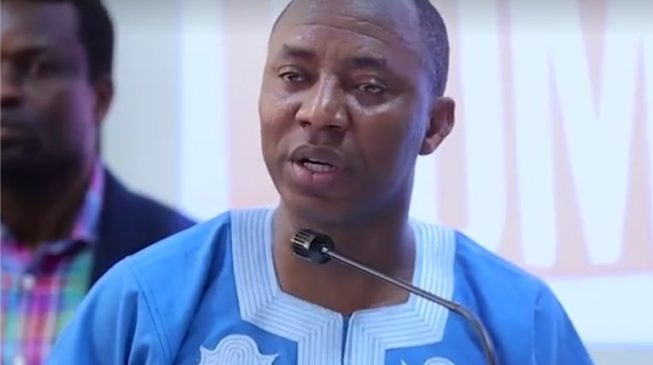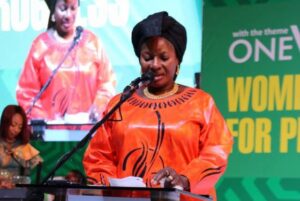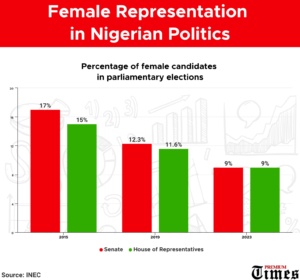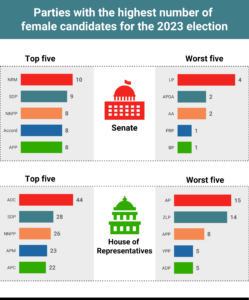Only 5% of Nigeria’s lawmakers are women, it’s about to get worse

 Women’s representation in Nigeria’s parliament is among the lowest in the world but could get worse based on the new list of candidates for the next parliament.
Women’s representation in Nigeria’s parliament is among the lowest in the world but could get worse based on the new list of candidates for the next parliament.
At present, only 7.3 per cent (8 of 109) of Nigeria’s senators are women while only 3.6 per cent (13 of 360) of the members of the House of Representatives are women.
Despite the low representation in the current parliament, the percentage of female candidates in the elections that produced the current lawmakers is higher than what obtains in the list for next year’s parliamentary elections.
In 2019, 12.3 per cent of the senatorial candidates were women; three percentage points higher than the nine per cent for next year’s election. Also, in 2019, 11.9 per cent of the House of Representatives candidates were women; the figure is also nine per cent for the 2023 election.

The 2023 List
The Independent National Electoral Commission (INEC) recently released the final list of candidates for the 2023 polls. The list has only 374 women among the 4,223 candidates running for the 469 seats in the National Assembly: 109 in the Senate and 360 in the House of Representatives.
As has been the tradition since Nigeria returned to democracy in 1999, the list highlights the poor representation of women in politics in Africa’s most populous country and one of the world’s largest democracies.
In fact, one of the 18 registered political parties, the African Action Congress (AAC), which has long-time activist and Publisher of Sahara Reporters, Omoyele Sowore, as its presidential candidate, has no female candidate for any federal legislative seat.

The presidential candidate of the African Action Congress (AAC), Omoyele Sowore,.
But the party’s National Publicity Secretary, Olufemi Adeyeye, attributed this to a prolonged leadership crisis that almost stopped the party from taking part in the forthcoming polls.
The 17 other political parties have only 92 female senatorial candidates, representing nine per cent of all the 1,101 senatorial candidates; and 282 for the House of Representatives, also representing nine per cent of the total 3,122 candidates all the parties are presenting for the 360 seats in the House.
No party has a female candidate for federal legislative seats in five of the 36 states of the federation – Bauchi, Kano, Sokoto, Yobe and Taraba – and the Federal Capital Territory (FCT).
Situation growing worse
Compared with the statistics of the parliamentary elections of 2015 and 2019, female representation in the 2023 polls is the worst, despite increased agitation in the last three years for gender balance and more active female participation in politics.
According to a report by a civil society organisation, YIAGA Africa, titled; “No Country Without Women,” women held 12.3 per cent of the tickets for Senate seats in 2019, “a decline from the 17 per cent in the 2015 elections.”
“For the House of Representatives, women’s candidacy was at 11.6 per cent in 2019, which was a decline from 15 per cent in the 2015 elections, and for State Assembly, the candidacy of women was at 12.7 per cent in 2019, revealing a decline from 14 per cent in 2015,” the YIAGA Africa’s Director of Programmes, Cynthia Mbamalu, wrote in an article under the title: “Women: Balancing Representation through Constitutional Reforms.”
Ms Mbamalu warned that Nigeria is heading to an almost all-male legislative house “if legislative measures are not taken to guarantee women’s representation in elective offices.”
How political parties stand
The country’s largest political parties, the ruling All Progressives Congress (APC) and the main opposition Peoples Democratic Party (PDP), are not showing leadership to the other parties in gender parity; based on the number of female candidates they presented.
Only six per cent of the APC’s National Assembly candidates are women while that of the PDP is five per cent.
For the senatorial election, the National Rescue Movement (NRM) has the highest number of female candidates with 10 while the Africa Democratic Congress (ADC) with 44 candidates produces the highest number of female candidates for House of Representatives seats.
The Accord (A) party has eight female candidates for the Senate and 15 for the lower chamber; Action Alliance (AA) has two for Senate and 16 for the green chamber while Action Democratic Party (ADP) has five each for both chambers.
Action Peoples Party (APP) also has eight female candidates for both chambers, ADC has nine for Senate and 44 for the lower chamber, while the ruling APC has five for the Senate and 22 for the House of Representatives.
Meanwhile, the All Progressives Grand Alliance (APGA) has two female candidates for the Senate and 16 for the lower chamber while the Allied Peoples Movement (APM) has four for the Senate and 23 for the House of Representatives.
Booth Party (BP) has only one female senatorial candidate but six for the House of Representatives; Labour Party (LP) has four for the Senate and 12 for the lower chamber; NRM has 10 for the Senate and 11 for the lower chamber, while the New Nigerian People’s Party (NNPP) has eight and 26 female candidates for the Senate and House of Representatives respectively.
The PDP has five female candidates for the Senate and 19 for the green chamber while the Peoples Redemption Party (PRP) has one female senatorial candidate and 11 for the House of Representatives.
Also, the Social Democratic Party (SDP) has nine female candidates for the Senate and 28 for the House of Representatives while the Young Progressive Party (YPP) has five each for the two chambers and the Zenith Labour Party (ZLP) has six female senatorial candidates and 14 for the House of Representatives.
Female representation by states
Like the political parties, female representation by candidacy for the 2023 national elections also varies from one state to another. Out of the 36 states and Abuja, six (Bauchi, Kano, Sokoto, Yobe, Taraba and Abuja) have no female candidates for the National Assembly elections.
Akwa-Ibom in the South-south region and Gombe in the North-east have the highest number of female candidates for senatorial seats with nine and seven respectively. The two are followed by Anambra and Benue with six female candidates each, while Rivers and Lagos states also have five female candidates each for the upper legislative chamber.
Zamfara, Nasarawa, Kebbi, Kaduna, Ebonyi and Plateau states have one each for senatorial elections.
Meanwhile, for the House of Representatives, while Lagos has 26 female candidates, Jigawa has none. The other top states in this category are Imo (19), Rivers (18), Anambra (14), Osun (13), Akwa Ibom and Delta states, with 12 each. Benue, Cross River and Gombe have 11 each. The FCT and Oyo State also have 10 female candidates each across various political parties.
However, Kogi, Nasarawa, Zamfara and Yobe have one female candidate each for the lower chamber while the remaining states including Edo, Bauchi, Bayelsa, Borno, Ebonyi, Ekiti, Enugu, Kaduna, Kano, Ogun, Plateau, Sokoto, Taraba and Yobe, have less than 10 female candidates across the political parties.
Nigeria’s poor gender equality index rating
Various reports on the gender equality index have consistently ranked Nigeria extremely low both globally and in Africa.
Many have attributed this situation to what they described as a common patriarchal practice across the country’s societies.
This inherent culture, they said, has impeded various efforts, including deliberate government policies to right the wrong.
For instance, a recent report by the Gender Strategy Advancement International (GSAI), a non-governmental organisation, revealed that women’s political participation in Nigeria falls below the world and African continental standards.
The data showed that Nigeria ranked 181 of 193 countries on the Gender Equality Index, for countries with low women representation in governance.
The report links the situation to reasons such as “poor resource allocation in the economic and social sectors, frequent conflicts, forced displacements and inadequate inclusion of women and girls’ perspectives in policy-making decisions.”
Advocates react
Reactions have continued to trail what many gender advocates described as a surprising downward trend in gender balance attainment within the nation’s political space. They said only deliberate efforts such as a law mandating 35 per cent female representation in the parliament can change the narrative. A bill for such a law was rejected by the current parliament.
Speaking to journalists, women’s rights activist, Funmi Falana, said women already won a case in court that says women’s representation in all appointments should be 35 per cent.
“So based on that we have forwarded our petition to President Muhammadu Buhari to reconsider his appointed officials and put in more women,” she said.
Mrs Falana said the petition was written immediately after INEC released the list of candidates for the forthcoming elections.
She called on women to show more interest in politics. “They should not sit behind. They should rise and take their proper position in their society. Gone are the days when we believe that the place of the woman is in the kitchen.”
“The place of the women has since moved from the kitchen. A woman can become the president of the country or become the governor of a state,” she said.
Also speaking, a gender advocate and former Communications Coordinator at Actionaid Nigeria, Lola Ayanda, said the low representation of women in the candidates’ list simply reflects “the Nigeria we live in and how inclusive and gender-sensitive our political structures are.”
She said Nigerian women have the numbers and competence but that the missing links “seem to be utilising the power we wield to influence the outcome we envision.”
Ms Ayanda, founder of Girl Pro Nigeria, a gender advocacy group, listed four recommendations towards increasing female representation in national assemblies and other political seats in Nigeria.
She said, “Due to the patriarchal nature of our society, it is evident that women’s inclusion in governance and politics will not be actualised without institutionalising and enforcing policies and practices to make it happen. Nigerian women deserve a gender-sensitive constitution that guarantees special seats at the national assembly and affirmative actions for women in political parties and appointive positions.
“Regarding women’s inclusion in governance, Nigeria can take a cue from Rwanda, Tanzania, Botswana, and Senegal, to mention a few.
“And more than ever, women supporting women is gradually gaining ground, and we should sustain the momentum. As women, we have the numbers: we should throw our weight behind the few women who made a list. Women in power should also hold their offices and spaces in honour of the millions of Nigerian women. A win for one is a win for all.”
She also recommended ‘generational relationships’ among women through mentorship. She said Nigerian women should not wait till election season to “genuinely commit to making a real impact at the grassroots.”
35 per cent representation
In April, the Federal High Court in Abuja ordered the Nigerian government to enforce the National Gender Policy following a suit filed by some women groups for improved gender inclusion in public appointments.
It was reported that the Minister of Women Affairs, Pauline Tallen, said President Muhammadu Buhari will ensure the implementation of the court judgement reserving 35 per cent of appointments in the public offices for women.
Gender Bill
In December 2021, a bill called the gender bill sponsored by the senator representing Ekiti South, Biodun Olujimi, was stepped down for the third time since March 2016 after some senators raised concerns over possible infringement on Islamic morals.
The bill seeks to guarantee the rights of women to equal opportunities in employment, equal rights to inheritance for both male and female children; equal rights for women in marriage and divorce, and equal access to education, property or land ownership and inheritance.
It also seeks to protect the rights of widows; guarantee appropriate measures against gender discrimination in political and public life and prohibit violence against women.
The bill was rejected by lawmakers who argued that the Nigerian Constitution was clear on the rights of citizens, including women.
Meanwhile, in March, the National Assembly submitted an amended 1999 Constitution but rejected all five gender bills during the voting on the amendment.
A coalition of 229 women groups in a statement condemned the rejection, describing the development as sad.
The co-convener of Womanifesto, Abiola Akiyode-Afolabi, lamented that lawmakers “voted to deny women the ability to take indigeneship in their husband’s state after five years of being together and also rejected 35 per cent appointed positions for women.”
Culled from: Premium Times





